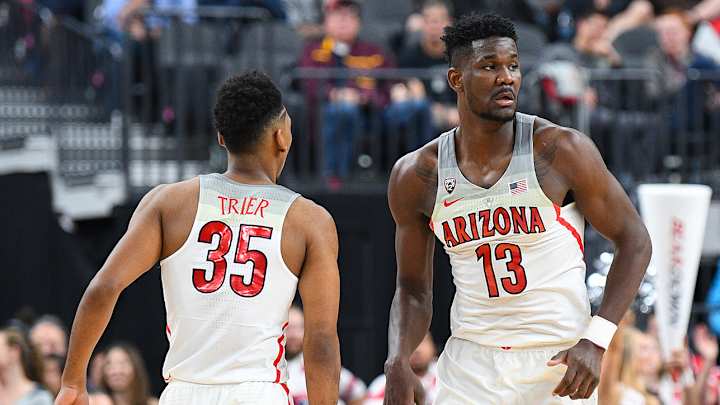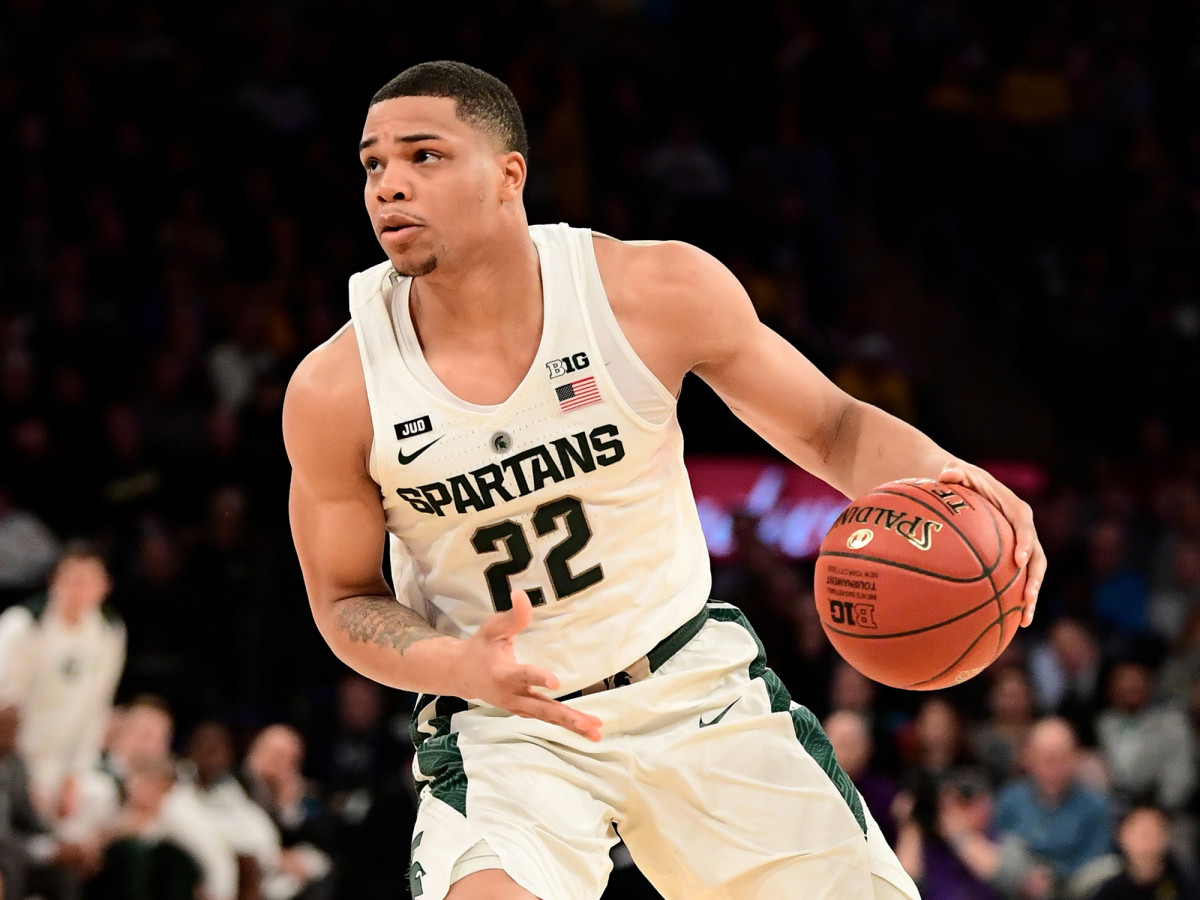Six Top-Seeded Teams in the Most Danger of Losing Early in the 2018 NCAA Tournament

Here’s some bad news for the people in your life who join the college basketball season during the second week of March, pick the top seeds to win almost every game and somehow walk away with office pool bragging rights: Most of 2017–18’s best teams have been exceptionally bad at sticking to the script. After a regular season that featured top-five upsets on a weekly basis and left almost every team with at least one truly head-scratching loss, chalk would qualify as a surprise outcome in this year’s NCAA tournament.
The three days between Selection Sunday and Round 1 coincide with a swell of public momentum in favor of the No. 11- and 12-seeds in best position to pull off opening weekend upsets, but that focus tends to distract from the upper-echelon teams that leave us genuinely stunned when they bow out before the end of the first weekend. If it were at all easy to see those losses coming, the favorites wouldn’t be seeded high enough to enable the matchup. Still, a handful of teams that earned top-four seeds in their respective regions reside in the Danger Zone, with some fatal flaw, nightmare matchup or bad karma looming that could thwart their Sweet 16 hopes.
They may not get bounced in the first round (at least not all of them), but think long and hard before hitching your wagon to any of these six squads for a deep March run.
Auburn (No. 4 seed, Midwest Region)
The Tigers limped to a share of the SEC title, losing three of their final five regular season games before falling victim to the Collin Sexton Show in their SEC tournament opener against Alabama. That put a damper on a campaign in which head coach Bruce Pearl lit up the SEC with a relentless, three-heavy offense run by a smallball lineup born out of the school’s decision to sideline sophomore frontcourt contributors Danjel Purifoy and Austin Wiley in the wake of the FBI’s findings against former assistant coach Chuck Person. When Anfernee McLemore, another sophomore forward, was lost for the year with a dislocated ankle in mid-February, that rotation got critically thin, putting the Tigers on level pegging with the undersized teams standing in their way.
Both College of Charleston, which took care of the ball better than anyone in the Colonial, and potential second-round opponent Clemson, which plays relentless interior defense despite not having a player over 6’9”, could stop the shorthanded Tigers short of a measuring-stick Sweet 16 game against top-seeded Kansas.
Arizona (No. 4 seed, South Region)
Super-freshman Deandre Ayton heads into the tournament on a high after raising his game to a terrifying level in the Pac-12 tournament, finishing with 32 points and double-digit rebounds in each of Arizona’s final two games. But with a piece of net tied to his hat, Ayton was comfortable enough to reveal that nerves factored into his quiet 10-point night in the Wildcats’ win over Colorado to start the tournament, an admission that highlights how risky it can be to bank on blue-chip freshmen driving the bus this time of year. Arizona opens with Buffalo, which sits seventh in the nation with 84.8 points per game and will be eager to try its hand at a Pac-12 track meet. The Bulls don’t have the size or talent to contain Ayton inside without some good fortune, but Kentucky (a potential second-round foe as the No. 5-seed) and Virginia (the No. 1 overall seed that could be waiting in the Sweet 16) do. Sean Miller’s group may be hotter than any other team listed here, but being dropped into a region where defense and toughness are expected to reign was a less-than-ideal outcome.

Michigan State (No. 3 seed, Midwest Region)
For a team that lost four times, stayed in the AP top 10 all year and has a coach whose consistency come tournament time remains a trusted meme despite two first-weekend exits in two years, Michigan State has not always inspired confidence in the past month. The Spartans have the third-best scoring margin in the nation (16.2 points) but had some close shaves late in Big Ten play—including dicey wins at home against Rutgers and at Indiana, Iowa, Northwestern and Wisconsin—and then couldn’t muster an adequate response when Michigan went on a second-half run in the Big Ten tourney semifinals.
The Spartans still rebound like crazy, shoot the three better than almost anyone in the country (they sit fifth in the nation at 41.3% from deep) and boast two lottery pick candidates in freshman Jaren Jackson Jr. and sophomore Miles Bridges, but they’ve landed a dangerous draw for a top seed that likes to play with its food. Up first is No. 14 seed Bucknell, which won the Patriot League by four games on the strength of an upperclassmen-rich rotation and pulled off back-to-back first-round wins in 2005 (Kansas) and ’06 (Arkansas). For all their flaws, potential second-round opponents TCU and Arizona State both spent time in the top 10 around the holidays. And a Champions Classic rematch with Duke looms in the Sweet Sixteen.
Texas Tech (No. 3 seed, East Region)
After grabbing everyone’s attention by knocking off Kansas in Lawrence and edging West Virginia when the Mountaineers were ranked No. 2, the Red Raiders came back to Earth down the stretch with a four-game losing streak to land a No. 3 seed and a date with 2016 tournament darlings Stephen F. Austin. Star senior Keenan Evans enters the tournament at less than 100% after mid-February turf toe issues, and Texas Tech’s ability to support its stellar defense with offensive production takes a big hit when Evans isn’t right. The Red Raiders do get to play their first two games in Dallas, just a five-hour drive away from home, but they will have to limit some tricky, streaky offenses to make it to Boston.
Xavier (No. 1 seed, West Region)
Why is everyone so down on the Musketeers, which ESPN’s Basketball Power Index rates as the third-weakest 1-seed in the past 10 years? One answer lies in Kenpom.com’s Luck metric, where Xavier tops all power conference teams with a +.109 deviation from its expected winning percentage based on its game-to-game efficiencies. The Musketeers have won a handful of close games against lesser opponents that might have knocked them off the top line had any swung the other way: East Tennessee State, DePaul (twice), St. John’s and Georgetown all came within five points of an upset. Xavier may be getting the same treatment Gonzaga did when the Bulldogs finally started to earn No. 1- and 2-seeds, with skeptical onlookers watching closely to see how a perennial March overachiever handles front-runner status. A tricky second-round matchup with either Missouri or Florida State in Nashville should be an adequate litmus test.

Cincinnati (No. 2 seed, South Region)
Much like the No. 1 seed in their region, the Bearcats have ground their opponents down with defense and are more than comfortable playing plodding games in the 50s (or lower), but if those shots stop falling through unfamiliar rims, their slow pace can keep lesser teams within striking distance longer than Mick Cronin would prefer. No. 15-seed Georgia State will hang out in a zone and dare Cincy’s backcourt to bury another first-round upset bid by colorful Panthers coach Ron Hunter, and if the Bearcats reach the second round their hardworking frontcourt could have its hands full on the glass with Texas’s Mo Bamba and Dylan Osetkowski or Nevada’s Martin twins, Cody and Caleb.
